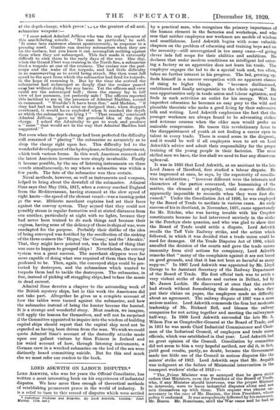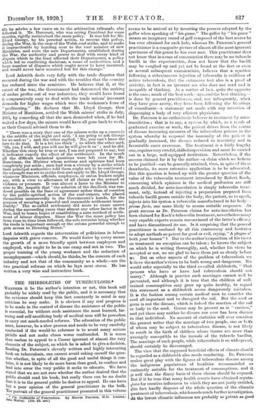LORD ASKWITH ON LABOUR DISPUTES.* LORD Ammer's, who was for
years the Official Conciliator, has written a most interesting book on his experiences of industrial disputes. We hear more than enough of theoretical methods of establishing permanent peace in the world of industry. It is a relief to turn to this record of disputes which were settled
• Indushial Problem, sad Displace. By Lord Aekwit.h. London: Joh. Murray. 121e. net.'
by a practical man, who recognizes the primary importance of the human element in the factories and workshops, and who sees that neither employers nor workmen are models of wisdom and unselfishness. Lord Askwith begins with some valuable chapters on the problem of educating and training boys and on the necessity—still unrecognized in too many cases—of giving clever lads full scope for their abilities and ambitions. He declares that under modern conditions an intelligent lad enter. ing a factory as an apprentice does not learn his trade. The employer engages the lad to do a special task and, too often, takes no further interest in his progress. The lad, growing up, fords himself in a narrow occupation with no apparent chance of rising to higher things. He " becomes disillusioned, embittered and finally antagonistic to the whole system." He sees opportunities only in trade union and labour agitation, and finds in such activities an outlet for his energy. With his imperfect education he becomes an easy prey to the wild and plausible theorists who make a good living by their subversive talk and writing. Lord Askwith emphasizes the fact that the younger workmen are always found to be advocating strikes and extreme courses when the older men would prefer an amicable compromise. He traces this revolutionary fever to the disappointment of youth at not finding a career open to talent in every trade. There is sound sense in the diagnosis, and it would be well if all employers were to act on Lord Askwith'e advice and admit their responsibility for the proper training of the young people in their factories. The more skilled men we have, the less shall we need to fear any disastrous upheaval.
It was in 1895 that Lord Askwith, as an assistant to the late Lord James of Hereford, first studied a labour dispute. He was impressed at once, he says, by the superiority of eoneilia• tion to arbitration ; "however different were the interests and characters of the parties concerned, the humanizing of the matter, the element of sympathy, could remove difficulties apparently impossible to reconcile when they were first dis- cussed." Under the Conciliation Act of 1896, he was employed by the Board of Trade to mediate in various cases. An early success of his in Scotland, in November, 1897, came opportunely for Mr. Ritchie, who was having trouble with his Croydon constituents because he had intervened unwisely in the strike in the Penrhyn slate quarries, and who was glad to show that the Board of Trade could settle a dispute. Lord Askerith recalls the Taff Vale Railway strike, and the action which followed, in which it was decided that a trade union could Le sued for damages. Of the Trade Disputes Act of 1906, which annulled the decision of the courts and gave the trade unions immunity from civil actions for conspiracy, Lord Askaith remarks that " many of the complaints against it are not based on good grounds, and that it has not been so harmful as many suppose." In 1907 Lord Askwith was appointed by Mr. Lloyd George to be Assistant Secretary of the Railway Department of the Board of Trade. His first official task was to settle a very violent strike of dockers and carters in Belfast. led by Mr. James Larkin. He discovered at once that the carters had struck without formulating their demands ; when they put their claims on paper, the employers made no difficulty about an agreement. The railway dispute of 1907 was a more serious matter. Lord Askwith commends the firm but moderate leadership of Mr. Richard Bell, and blames the railway companies for not acting together and meeting the railwaymen half-way. In 1909 Lord Askwith succeeded the late Mr. A. Wilson Fox as Comptroller-General at the Board of Trade, and In 1911 ho was made Chief Industrial Commissioner and Chair- man of the Industrial Council, of employers and trade union officials, which was established in that year. Lord Askwith had no great opinion of the Council. Conciliation by committee did not seem to him a very hopeful method, nor did it, in fact, yield good results, partly, no doubt, because the Government made too little use of the Council in serious disputes like the miners' strike of 1912. Lord Askwith says that Mr. Asquith was indignant at the failure of Ministerial intervention in the transport workers' strike of 1912:
"The ,Prime Minister was so annoyed that he gave strict orders that Ministers, even the President of the Board of Trade, who, if any Minister should intervene, was the proper Minister to intervene, were to leave industrial disputes alone and not mix themselves up with them. This request was almost un- necessary in the case of Mr. Buxton, the then President, whose policy it endorsed. It was scrupulously followed by his successor Ws Burns. Mr. Runcinsan, until the War came and he had tilt by advice a few cases on to the arbitration tribunals, also followed it. Mr. Harcourt, who was acting President for some months, rigidly maintained the same policy. It was loft for Mr. Lloyd George, by his personal action, to reverse this policy, during the War, in the case of the Welsh coal strike, and to make it impracticable by handing over to the vast number of new ministries, and even the new Departments, established during the War, the authority end power to deal with every kind of dispute which in the least affected their Departments, a policy which led to conflicting decisions, a maze of authorities, and a large number of disputes which ought never to have occurred, and would never have occurred but for this change."
Lord Askwith deals very fully with the trade disputes that occurred during the war and with the troubles that the country has endured since the armistice. He believes that if, at the outset of the war, the Government had denounced the making of undue profits out of war industries, they would have found it comparatively easy to deal with the trade unions' incessant demands for higher wages which were the workman's form of "profiteering." He declares that Mr. Lloyd George, then Minister of Munitions, settled the Welsh miners' strike in July, 1915, by conceding all that the men demanded when, if he had waited a few days, the miners would have all gone back to work, as their Council advised them to do.
" There was a story that one of the miners woke up a comrade in the middle of the night and said, ' I am going to ask George for so-and-so ' ; and the other replied, No, you can't have the face to do that. It is a bit too thick' ; to which the other said, ' Oh, yes, I will, and you will see he will give it us ' ; and he did. Whether this story be true or not, I am not prepared to say, but it indicates exactly the effect of the settlement. In the result all the difficult technical questions wore left over for Mr. Itunciman, the Minister whose actions and opinions had been completely put aside ; men had won a victory by a strike which their principal authorities told them ought not to be continued ; the example was set to strike first and apply to Mr. Lloyd George, whatever Ministers, officials, employers, or union leaders might say, with a view to allowance of all claims as the reward of violence or pressure. It was almost a farce to the Minister to wire to Mr. Asquith that ` the solution of the deadlock was ren- dered possible on the lines of agreement rather than of coercion by the public-spirited action of the coal-owners, who placed themselves unreservedly in the Government's hands, for the purpose of securing a peaceful and reasonable settlement imme- diately.' The so-called settlement did more to cause unrest during the succeeding years than almost any other factor in the War, and to lesson hopes of establishing a sane method of settle- ment of labour disputes. Since the War the same policy has from time to time been followed, the sole restraint being whether the trade is important enough or the unions powerful enough to gain access to Downing Street."
Lord Ask-with regards the intervention of politicians in labour disputes with grave concern. He would foster by every means
the growth of a more friendly spirit between employers and employed, who ought to be in one camp and not in two. The proper training of the young workmen and the reduction of unemployment—which should, he thinks, be the concern of each industry and not that of the community as a whole—are the two practical reforms on which he lays most stress. He has written a very wise and instructive book.







































 Previous page
Previous page